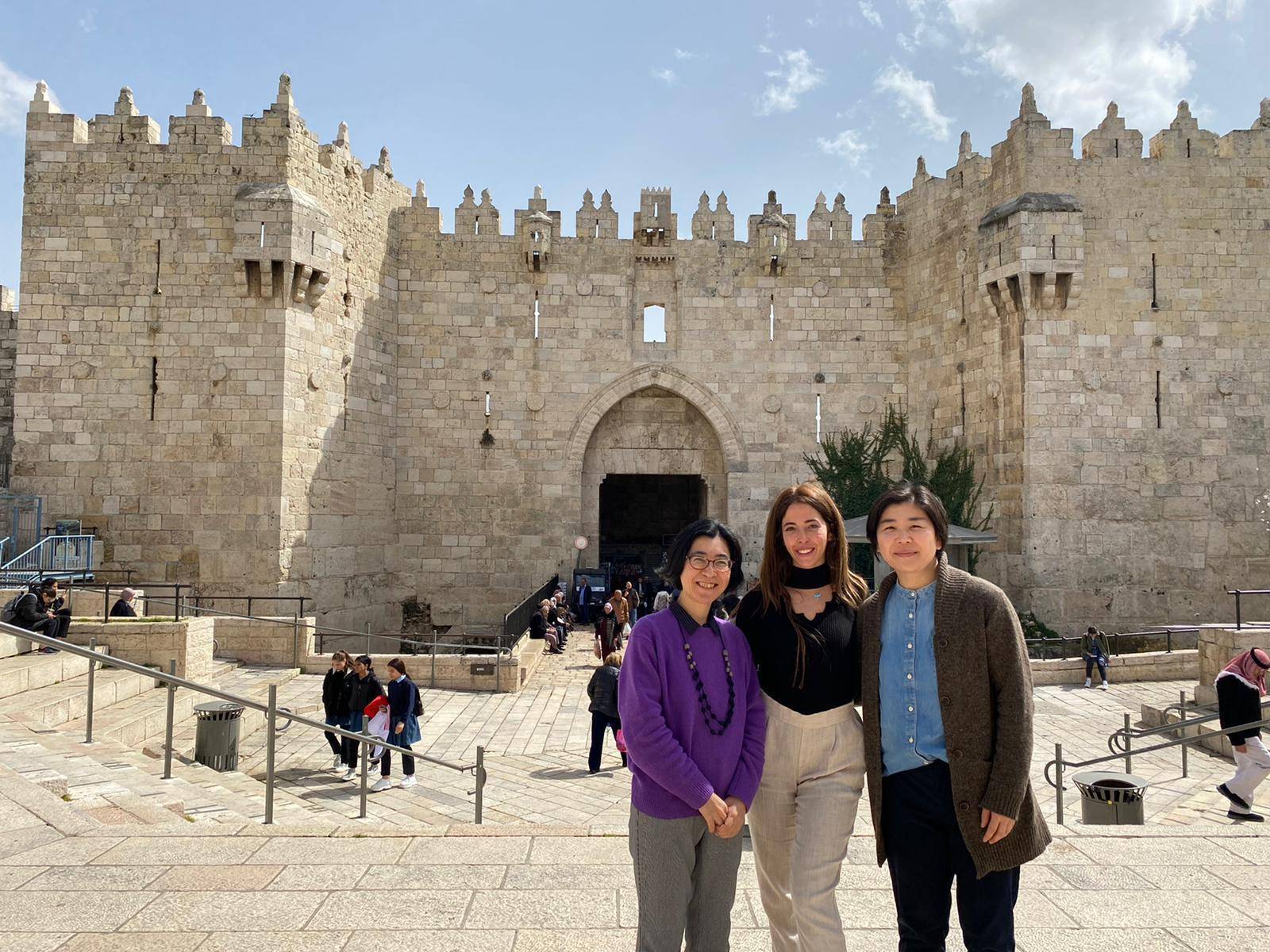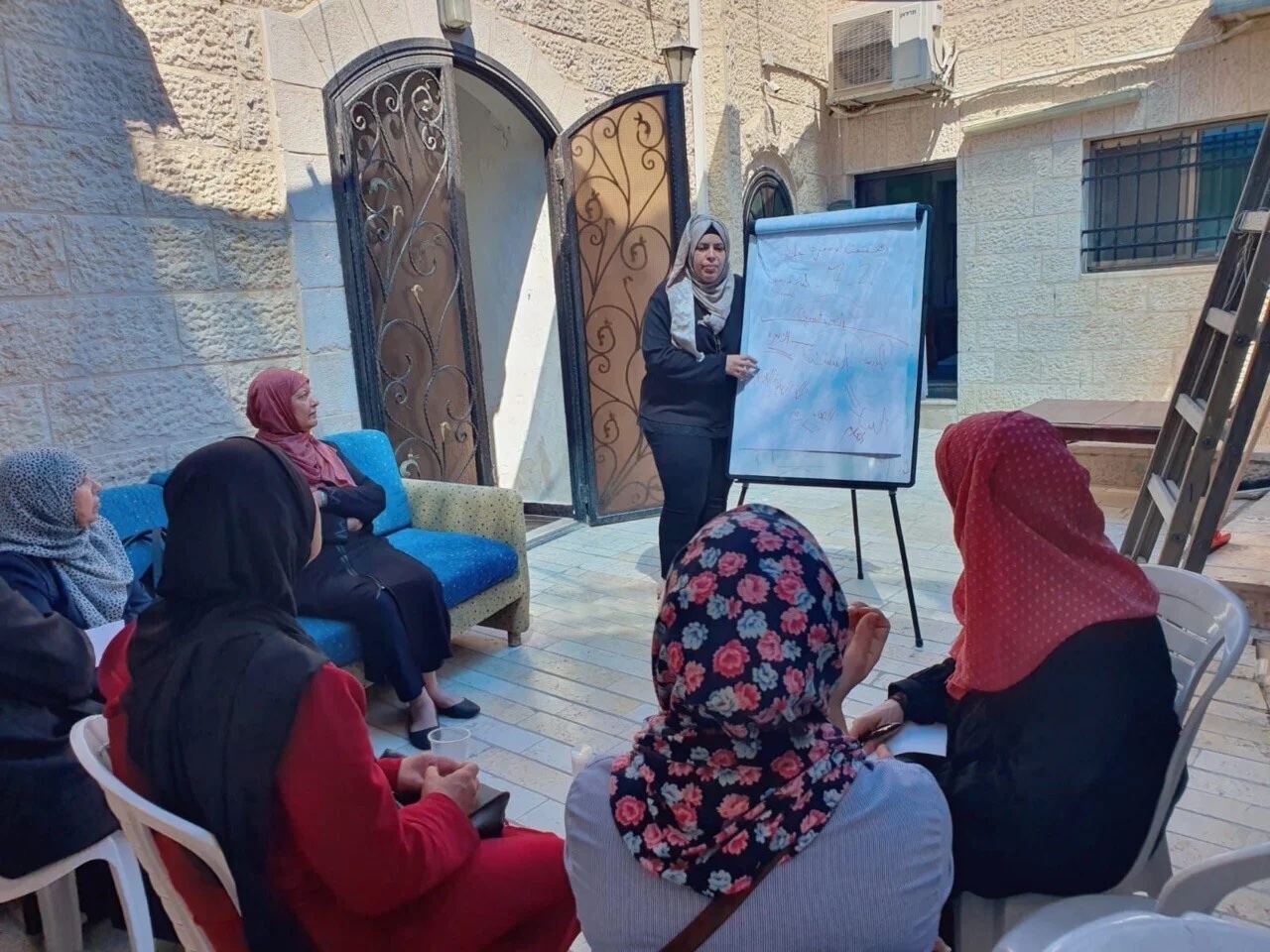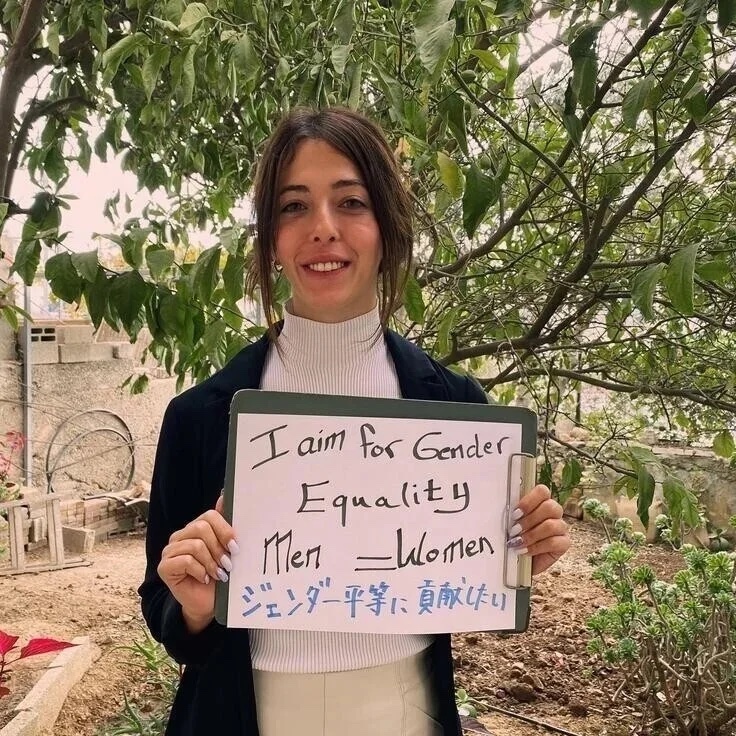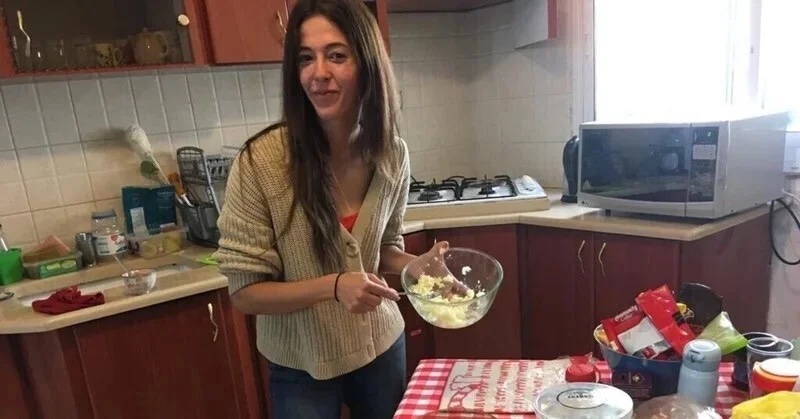[Original published in note.com by Akie MITA (July 13, 2022); Translated by A. Turner]
Hi all, my name is Mita and I’m an intern with JVC!
Today we hear Ayat’s experiences supporting JVC’s activities in our office in Jerusalem, Palestine! Ayat is a very passionate person and was kind enough to share with us her strong beliefs.

My interview with Ayat
Q: Let’s start with a self-introduction!
(Ayat) My name is Ayat Yaghmour. I’ve been volunteering with JVC since 2018 and began officially working here in May last year. I have three younger sisters, and I enjoy yoga and hiking.
(Mita) Yoga is such a nice hobby!
(Ayat) I like to do a lot of variations of yoga. I generally stick to ashtanga, hatha and vinyasa, but I sometimes do yoni yoga as well!
(Mita) You mentioned that you’ve been involved with JVC since 2018…?
(Ayat) At the moment I’m working as an assistant field officer, but, beforehand, I was involved in projects involving schools in East Jerusalem as a volunteer. I now assist in a women’s empowerment program in East Jerusalem as well as activities in Gaza.
Q: Have you been to Japan before?
(Ayat) I still haven’t been. I’m a total extrovert and so curious about the world, so there are a bunch of places I want to visit, but I’m also a picky eater…
(Mita) In a staff interview with Trial & Error, the newsletter of JVC, you mentioned that you wanted to go to Germany this year, right?
(Ayat) That’s right! I have the trip scheduled, but I have yoga workshops to attend too so I have to choose one or the other. I wish I could just do both!

(From left to right) Kimura, Ayat and Osawa from the Jerusalem office
Q: What languages do you use in your day-to-day life?
(Ayat) I mainly speak Arabic. I’m also learning Hebrew, as Palestine is occupied by Israel, so Hebrew is necessary to communicate with Israelis and fill out forms for the Israeli government.
(Mita) Not to forget you’re speaking English now. Did you learn it at school?
(Ayat) We learned English as our second language. My school really pushed learning English, but it looks like nowadays Hebrew is becoming increasingly popular. Hebrew isn’t a universal language though. My generation learned English instead.
Q: As someone based in Jerusalem, what is your favourite aspect of it?
(Ayat) Jerusalem is a beautifully historic place. It’s such a diverse place with so many people of different cultures and religions, there are plenty of reasons people around the world want to visit. It’s also very expensive though.
(Mita) Really!? What exactly is so expensive?
(Ayat) Water, electricity, food — everything. The demand is high, so the price is high. It’s not just expensive for tourists, everyone living here has to pay the same prices. There are lots of consulates in Jerusalem. I heard that where there are consulates and other government residences, prices go up.
But Tel Aviv (Israel’s de facto capital city) is even more expensive. It’s along the coast, and it’s known as an innovative and corporate city. The people that work there get paid quite a bit though, so you can’t compare it to Jerusalem. The people that live in Jerusalem don’t earn that much, so you really feel the cost here.
(Mita) Wow! I had the image that it’d be cheap to live there, I’m so surprised!
Q: Why did you decide to work with JVC?
(Ayat) It’s related to the field I studied and I’m a real extrovert, so I wanted to work somewhere that I could meet people and hear their stories. Since I quit journalism, I haven’t been able to do interviews based on political affairs, but I wanted to do something near that field that would really help people! Although I do hate office work…
(Mita) Then what you do now is a perfect fit! Though there is still some office work…
(Ayat) True! The reason that I chose JVC is because I see results. I looked into some other NGOs, but it’s so common that even after projects are completed, nothing is really achieved. It really felt like they didn’t understand what was happening in Palestine, or that they didn’t really care.
But JVC doesn’t just hand off money and leave, they take the time to understand the situation and get to know every single person through their workshops and educational programs. I saw how JVC saw through seeing people’s lives changed, and I decided to work here.

A workshop in progress
Q: What do you think is most important when running women’s empowerment workshops in Palestine?
(Ayat) The most important thing that we can teach women is to have self-confidence. Once they have that, they understand that there is more they can do, and set out to achieve it. Even if their marriage didn’t work out, even if their family is experiencing financial hardship, even if they’ve experienced domestic violence, they are so much more beyond the things that have happened to them.
There is a financial aspect to the empowerment program we run. We mostly run training to prepare them for work. By learning workplace skills, they can learn that there are so many more things they can achieve beyond being a housewife or a mother. I’m not saying that to be a housewife, or a mother is a bad thing, but that it’s important for them to know that they have the option and the right to choose to do what they want to do.
(Mita) What exactly do you do in the training to prepare them for work?
(Ayat) We teach them about their rights, communication methods, negotiating skills and marketing. We also have a workshop about managing stress. We aim to offer them support for their mental health, have them fully engage in the workplace training, and start thinking about beginning their own businesses, stepping outside their comfort zone and seeking education.
We also know that money is necessary to gain independence. Even if they don’t have their own business, I want them to know that it’s something that they can achieve.

Of course, there are things that we need to outright oppose as well. The first is the cycle of abuse that results from the oppression that men face at the hands of the military occupation, the oppression women face from those men, and the oppression children face from those women. The second is the idea that men are the top of the family and women have no choice but to marry. We need to get rid of this stereotypical thinking.
(Mita) Are those stereotypes still common?
(Ayat) They’re still around. But what scares me the most is the fact that it’s not just Palestinians that think this way, it’s the world.
Women work on top of the domestic labour they perform as a housewife or mother, and don’t receive any thanks for it, let alone have their opinions heard in important family decision-making. It’s because of this that we don’t just offer training to prepare them for work but teach them about their rights and their value as people. Once they understand that, we hope that they see that they can choose how they want to live their life.
(Mita) Are there women who have really had a change of heart because of these workshops?
(Ayat) There’s plenty of them! Many have said that they feel more comfortable than they did before.
Some men have noted that they have come to respect their wives for bringing income to the family, and there are families that have made more room for the wife to work as a result. This has a good effect on the children, too. Before they could only rely on the father’s income, but now that the mother is earning money in the same way, they learn to respect their mother more as well.
(Mita) That sort of attitude can lead to a much more positive cycle going in the future!
(Ayat) That’s right!
Q: There are Japanese staff as well as staff from other NGOs working in the Jerusalem office, and with everyone’s different backgrounds and upbringings, I’m sure there are bound to be some misunderstandings. How do you communicate in the office?
(Ayat) There definitely are times that misunderstandings arise. But I always aim to communicate myself in a professional manner. I’m very upfront, so when I believe that a misunderstanding or even a mistake has arisen, I always make sure to explain the details or have details clarified for me in meetings and emails.
We also like to all gather at a big table in the office, bring food from home and eat together to create a better atmosphere not just professionally, but privately. I’m not a big fan of Japanese food… but everyone loves sushi! I also love to share Arab food and always make sure to bring it to the office. Sometimes we’ll cook together! The office also has a lovely garden, so we like to spend our breaks and days off out there bathing in the sunlight and chatting together!
(Mita) It sounds like you’re spending some fantastic time with fantastic people!

Q: Let’s end with a message to any of the people reading this article!
(Ayat) As a Palestinian, I’m so grateful that you are taking the time to understand the situation in Palestine and donate to the cause. It’s so meaningful, because it’s not governments or countries, but individual people who are connecting with us, showing your concern and donating, and it’s so touching! I hope that more people come to know about the work we do!
——
I was deeply moved by the passion and strong will for change that Ayat showed us all in this interview. Hearing her words has inspired me to see myself one day the activities that JVC holds in Palestine and the hard work that Ayat puts into them and has really motivated me to learn more about women’s rights and empowerment!
Thank you for reading. If you liked the article and find that you’re interested in JVC, please leave a like and follow. (Mita)
Share This: